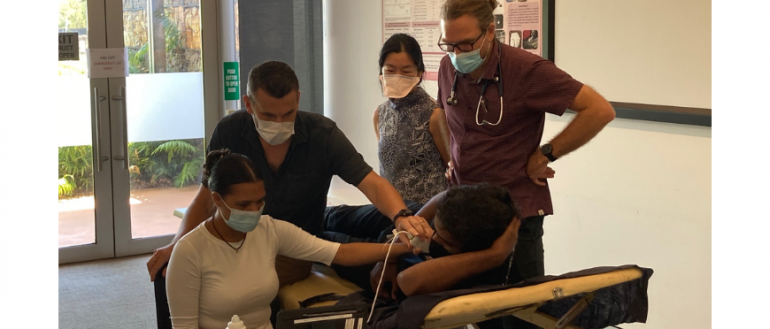Image caption: Menzies Associate Professor Joshua Francis and his team teaching clinicians how to use echocardiography equipment.
A Menzies-led team has received nearly $1 million to help improve Rheumatic Heart Disease (RHD) care by working closely with communities in the Northern Territory and Western Australia.
The new 3-year Non-Expert Acquisition and Remote Expert Review of Screening echocardiography images from Child health and AnteNatal clinics (NEARER SCAN) study will look at improving access to culturally safe, best quality care for RHD in high-burden Aboriginal and Torres Strait Islander communities.
The research made possible through a Medical Research Future Fund (MRFF) Cardiovascular Health Mission Grant, addresses an urgent need to enhance and accelerate diagnosis of RHD outside acute health settings, and improve outcomes.
The study will be conducted in partnership with community leaders and local partners. An implementation strategy will also be developed in partnership with communities, using principles of co-design, community participation and capacity building for local healthcare staff.
RHD disproportionately affects Aboriginal and Torres Strait Islander people contributing to long-term cardiovascular morbidity in children and adults. In some NT communities, the prevalence of RHD is as high as 5 per cent among school children.
Clinical presentations with RHD are often late in the disease progression, and opportunities for prevention or early treatment are often missed.
Menzies Associate Professor Dr Joshua Francis said the NEARER SCAN study, aims to evaluate the implementation of a diagnostic approach to screening for RHD in children and pregnant women.
“By incorporating novel technology, such as handheld echocardiography performed by local healthcare staff, with an offsite image review, into routine health service provision, we hope to improve detection of RHD in communities, which can lead to better health outcomes,” A/Prof Francis said.
Echocardiography uses ultrasound to scan the heart, and Menzies researchers have led on initiatives that involve training local clinic staff to use handheld ultrasound machines to detect evidence of RHD.
RHD is a significant problem in both remote Australia and also Timor-Leste.
“As a paediatrician and researcher working in both the Northern Territory and in Timor-Leste, this disease is very familiar. We see it affecting so many Aboriginal and Torres Strait Islander children in Australia.
“And in Timor-Leste it is very similar, except that many children present very late, with severe RHD, and sadly many children in Timor-Leste die because of rheumatic heart disease,” A/Prof Francis said.
“Our work screening school-aged children has been used by the Timor-Leste Ministry of Health to develop a national guideline for rheumatic fever and rheumatic heart disease. That guideline has been implemented all over the country now and that work is so important in terms of helping clinicians know how to respond to rheumatic heart disease,” A/Prof Francis said.
The research in Timor-Leste partners closely with research in the Northern Territory where the same approach is being used to train Aboriginal health workers to enable them to make diagnoses of rheumatic heart disease in their own communities.
For more information about the project head to our media release: training remote health workers to diagnose rheumatic heart disease.

